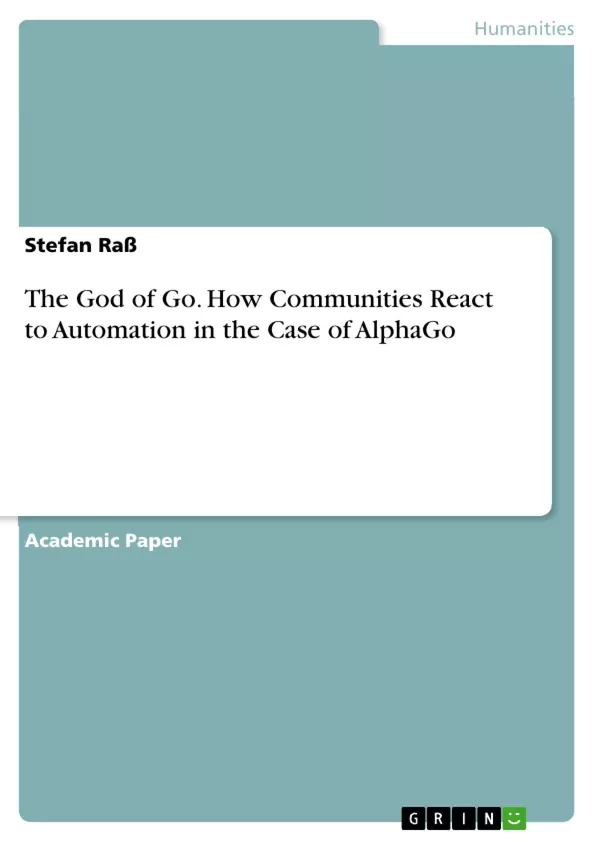Recent advances in artificial intelligence made it possible for computers to defeat the top Go players in the world, a milestone that has been thought to be decades away. This has put the Go-World in front of a new challenge, as they must negotiate their position in relation to this automated program. To understand how communities, react to automatization this paper follows the commentaries of top Go professionals to understand how they experienced the success of AlphaGo, the program that today is the best player of Go worldwide. The paper finds three main themes that permeate through the material. Some professionals feel alienated by the introduction of this superhuman player but most players see the potential to elevate the quality of play throughout the community. Furthermore, in contrast to previous Go programs AlphaGo seems to be anthropomorphized by researchers and players due to its significant superhuman capabilities.
Inhaltsverzeichnis (Table of Contents)
- Abstract
- Possibilities for our Grandchildren
- A Case for Go
- AlphaGo and the Deep Sea
- The God of Go
- Cooperation and Opportunity
- Human and Machine
- Conclusion
Zielsetzung und Themenschwerpunkte (Objectives and Key Themes)
This paper investigates the reactions of the Go community to the emergence of AlphaGo, a computer program that has surpassed human players in skill. It seeks to understand how the Go community navigates its position in relation to this automated program, examining how players have experienced the success of AlphaGo and its implications for the future of the game.
- The impact of automation on human communities, specifically within the context of a culturally significant game like Go.
- The potential for AI to elevate the quality of play in Go while raising concerns about the future of human players.
- The anthropomorphization of AlphaGo due to its exceptional capabilities and the implications this has for human perception of AI.
- The role of technology in reshaping societal interaction and decision-making processes in the context of an information explosion.
- The ongoing debate surrounding automation and its potential for both positive and negative societal impacts.
Zusammenfassung der Kapitel (Chapter Summaries)
The introduction contextualizes the study within the broader discussions of automation and its impact on society. It discusses the potential of AI to transform the way we interact, learn, and make decisions, highlighting both optimistic and pessimistic views on its implications. The paper then focuses on the case of Go, a game deeply rooted in human culture and considered a test of human intellect. Chapter 2 outlines the cultural significance of Go and introduces AlphaGo, the AI program that has disrupted the game's traditional dynamics. Chapter 3 delves into the reactions of Go professionals to AlphaGo's success, exploring their experiences and perspectives on the implications of this technological advancement.
Schlüsselwörter (Keywords)
Artificial Intelligence (AI), Automation, Go, AlphaGo, Human-Machine Interaction, Cultural Impact, Technological Advancement, Go Community, Information Explosion, Technological Utopias, Automation Concerns, Technological Unemployment.
Frequently Asked Questions
How did the Go community react to AlphaGo's success?
Reactions were mixed: some professionals felt alienated by a superhuman player, while many saw the potential for AI to elevate the overall quality of play in the community.
What does "anthropomorphization" mean in the context of AlphaGo?
Due to its exceptional capabilities, researchers and players often attribute human-like qualities or "divine" intelligence to AlphaGo, referring to it as the "God of Go."
Why is the game of Go significant for AI research?
Go was considered a major milestone because of its complexity and reliance on intuition, which was thought to be beyond computer capabilities for decades.
What are the main themes found in the professional commentaries?
The three main themes are alienation, cooperation/opportunity for improvement, and the changing relationship between human intellect and machines.
What are the concerns regarding automation in the Go world?
Concerns include technological unemployment for professionals and a shift in how humans value their own intellectual achievements compared to AI.
- Quote paper
- M.A. Stefan Raß (Author), 2019, The God of Go. How Communities React to Automation in the Case of AlphaGo, Munich, GRIN Verlag, https://www.grin.com/document/1001863



